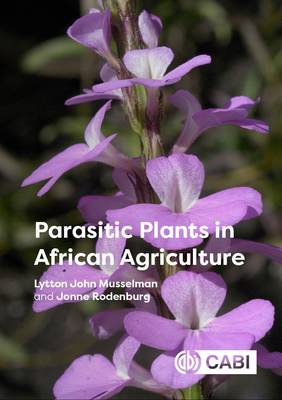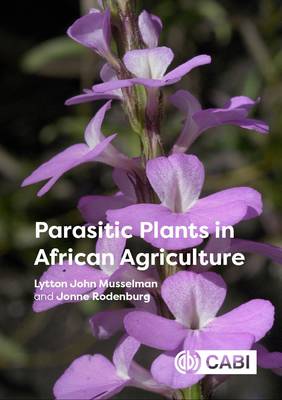
- Retrait gratuit dans votre magasin Club
- 7.000.000 titres dans notre catalogue
- Payer en toute sécurité
- Toujours un magasin près de chez vous
- Retrait gratuit dans votre magasin Club
- 7.000.0000 titres dans notre catalogue
- Payer en toute sécurité
- Toujours un magasin près de chez vous
Parasitic Plants in African Agriculture
Lytton John Musselman, Jonne Rodenburg
Livre relié | Anglais
171,95 €
+ 343 points
Description
Parasitic Plants in African Agriculture brings together for the first time in a single volume, the ecology, biology, damage, and control of all groups of African parasitic plants including both the relatively few parasites introduced to the continent as well as those native parasites that have spread from within Africa. The book covers the well-known witchweeds and broomrapes but also groups and species that have received less attention including mistletoes, dodders, rice vampire weed, and other species posing threats. The book distinguishes between stem and root parasitic weeds and between holoparasites and (facultative or obligate) hemiparasites. Based on their research and experience collectively spanning six decades, the authors provide an authoritative and state-of-the-art overview of the distribution, biology and impact of these highly specialized weeds and include recommendations for their management. Since parasitic plants in African agriculture primarily affect smallholder farmers, these weeds are explicitly discussed within a context of resource limitations and global changes. Readers are informed on all parasitic plant species relevant to African agriculture and the impact these plants have on crop production and livelihoods of smallholders in a changing world. Current and future management strategies are outlined in terms of their principles and effectiveness as well as their feasibility and affordability for farmers, all of which determine farmer adoption. The final chapter synthesises some of the relevant findings and statistics regarding parasitic weed distribution and their host crops and discusses implications in terms of future crop protection concerns in African agricultural systems. Key features: - Authoritative text based on extensive field and laboratory work.- First comprehensive state-of-the-art overview of parasitic plants and their management in Africa.- Highly illustrated with photos, graphs and species distribution maps.- Reviews previous basic and applied work, with relevance to smallholder farming systems.This book will be a valuable reference for students, researchers, extension workers, development officers, national agriculture researchers, plant pathologists, food security specialists, weed scientists, agronomists and botanists.
Spécifications
Parties prenantes
- Auteur(s) :
- Editeur:
Contenu
- Nombre de pages :
- 216
- Langue:
- Anglais
Caractéristiques
- EAN:
- 9781789247633
- Date de parution :
- 10-11-23
- Format:
- Livre relié
- Format numérique:
- Genaaid
- Dimensions :
- 172 mm x 244 mm
- Poids :
- 703 g

Les avis
Nous publions uniquement les avis qui respectent les conditions requises. Consultez nos conditions pour les avis.






